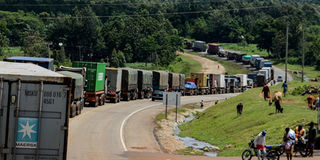Uniform EAC laws will fight tax evasion crimes

A queue of trucks at Malaba border. Fighting cross border crime requires tax commissioners to collaborate under a uniform regional law. PHOTO /FILE
What you need to know:
- There is need for collaboration to address the tax and revenue linkages.
Tax Investigation Commissioners are calling for seamless regional laws through which tax investigation can be conducted in the region.
Mr Denis Kugonza, Uganda Revenue Authority (URA) Commissioner Tax Investigation Department said there is need for collaboration to address the tax and revenue linkages which can not be done by a single country.
Joint efforts needed
“There is a need for closer collaboration across the region. As URA alone, we cannot fight the vice of tax evasion but once we are together, we can join the fight,” Mr Kugonza said.
He noted that the business people involved in tax evasion always think ahead, and have resources that can enable them to move resources from one place to another.
This was revealed during the meeting held by the East African Revenue Authorities Commissioners for Tax Investigation (EARACTI) from Burundi Rwanda, South Sudan, Kenya, Tanzania and Uganda who come together annually to come up with ways through which they can address the gaps and loopholes within the tax investigation department that makes the region lose billions of shillings due to tax evasions, held in Kampala yesterday.
“We always meet annually to discuss cross border crime and see how we can build capacity and share information to fight cross border crime in tax evasion. The EAC customers Act allows cross border trade with some goods within the region from one border to another. Some people are using this opportunity to evade tax.
In this matter, collaboration will help us declare so that any income earned by any tax payer can be declared in all taxation jurisdiction systems,” he added.

Kenya
Dr Tera Saidimu, Commissioner Intelligence and Strategic Operations at the Kenya Revenue Authority (KRA) recommended that technical committees are trained.
“We will be able to identify tax evasion schemes, and collect more taxes,” he said, noting that differentiating between the audit and investigation department will help avoid interference or delay of work and compromise,” Saidimu said.
Tanzania
Mr Everest Mashiba, Commissioner Tax Investigation at the Tanzania Revenue Authority (TRA) called for the amendment of East Africa Community (EAC) laws and introduce a plea bargain option.
Ms Joyce Wani, Acting Commissioner Internal Affairs in South Sudan said that they are still finalising the legal policy framework regarding the EARACTI.
“We do not have clear cut policies. The capacity and staff are not enough. But once we familiarise ourselves, we will distinguish integrity and investigation. This will also draw a line between audit and investigation,” she said.
Tax evasion
Ibrahim Bbossa, Acting manager public and corporate affairs at URA, noted that the commonly smuggled goods include cigarettes, fuels, cooking oil and rice.
However, he noted that URA is investing in quality informers to help them, especially from the porous borders.




